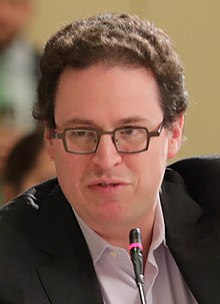Ben Nelson (businessman)
Ben Nelson | |
|---|---|
 Nelson in 2017 | |
| Education | University of Pennsylvania (BS) |
| Occupation(s) | Founder, Chairman, President and CEO, Minerva Project; Chancellor, Minerva University |
| Board member of | Intelligence Squared, San Francisco Opera |
Ben Nelson is the Founder and Chancellor of Minerva University as well as the Founder, Chairman, President and CEO of Minerva Project. Minerva Project is the for-profit educational organization that created the non-profit Minerva University with the mission of reforming global education through an interdisciplinary curriculum and fully active learning pedagogy, delivered on a proprietary learning environment called Forum.[1]
Prior to founding Minerva, he was the CEO and President of the global online photo hosting and printing company Snapfish at the time of its acquisition by HP.[2] Nelson joined Snapfish in 1999. By 2002, Nelson was the CFO of Snapfish and had established himself as one of the company's lead business strategists. He became CEO and President of Snapfish in March 2005, just before the acquisition of the company by Hewlett-Packard.[3] Afterwards, he continued to run the company as an HP subsidiary.[4]
Nelson graduated from the Wharton School at the University of Pennsylvania with a B.S. in Economics with Honors as a Joseph Wharton Scholar.[5][6]
References
[edit]- ^ "Debate: In An Online World, Are Brick And Mortar Colleges Obsolete?". National Public Radio. 9 April 2014. Retrieved 21 August 2014.
- ^ Kaminski, Matthew (9 August 2013). "Ben Nelson: The Man Who Would Overthrow Harvard". Wall Street Journal. Retrieved 21 August 2014.
- ^ "Snapfish Management Team" (PDF). Snapfish. April 2008. Archived from the original (PDF) on 12 September 2012.
- ^ Lidor, Danit (December 2, 2005). "Nelson's Snapfish Adds Publix To New Partners List". Forbes. Archived from the original on February 14, 2007.[dead link]
- ^ Wood, Graeme (13 August 2014). "The Future of College?". The Atlantic. No. September. Retrieved 12 September 2014.
- ^ "Speakers". New York Times Schools for Tomorrow. Archived from the original on 13 September 2014. Retrieved 12 September 2014.


 French
French Deutsch
Deutsch